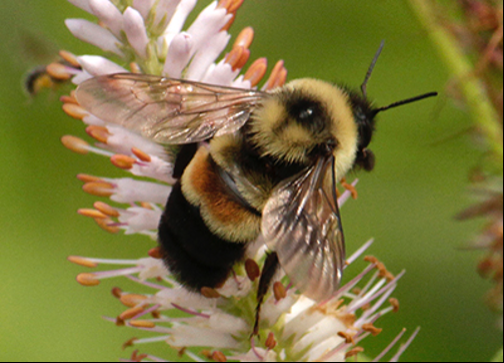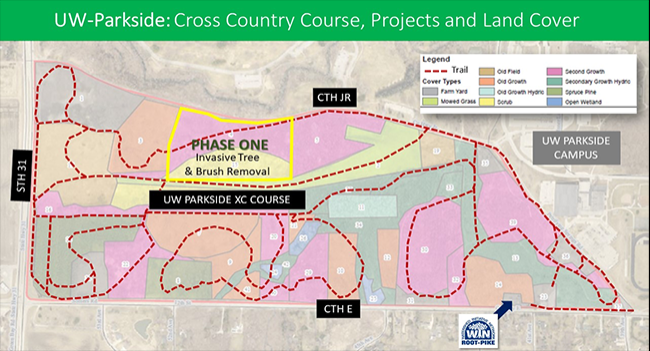
Cross country skiers, snowshoers and other winter outdoor enthusiasts may be surprised to see workers clearing trees and brush along UW-Parkside’s Wayne E. Dannehl Cross Country Course this month. They may be even more surprised to learn it’s being done to help protect a warm weather flier.
The Pollinator Patch Program is a partnership between the Root-Pike Watershed Initiative Network (WIN) and UW-Parkside to develop a land restoration plan and create more habitat for the Rusty Patched Bumble Bee while also preserving and enhancing the iconic cross country course on campus.
The Rusty Patched bee is a federally endangered insect and extremely rare in Wisconsin. Like other bees, the Rusty Patched bee is impacted by habitat and vegetation loss, herbicide and pesticide use, disease, and climate change.
The first phase of the three-year project involves clearing brush and trees to open up the canopy for more forest floor vegetation, which the bees prefer, as well as help rid the area of invasive and non-native/nuisance trees and shrubs (see map). Funding for the 20-acre project is being provided by the U.S. Fish and Wildlife Service and The Brico Fund.
Other work includes Root-Pike WIN volunteers creating trail signage to alert individuals about work in the area.
Even in this cold weather, we’re still working to save the Rusty-Patch,” said David Giordano, executive director of Root-Pike WIN. “We’re grateful for the funding and for UW-Parkside’s continued support of the project.”
UW-Parkside Chancellor Debbie Ford has watched the progress since the project started in 2019. “I’m excited to see what’s next for the Program and for the Rusty Patched Bee,” said Ford. “Our commitment to stewardship goes beyond education and involves many aspects of our community, including being excellent stewards of our natural resources.”
For more information please visit the Root-Pike WIN Pollinator Patch Program websitethree-year project involves clearing brush and trees to open up the canopy for more forest floor vegetation, which the bees prefer, as well as help rid the area of invasive and non-native/nuisance trees and shrubs (see map). Funding for the 20-acre project is being provided by the U.S. Fish and Wildlife Service and The Brico Fund.
Other work includes Root-Pike WIN volunteers creating trail signage to alert individuals about work in the area.
Even in this cold weather, we’re still working to save the Rusty-Patch,” said David Giordano, executive director of Root-Pike WIN. “We’re grateful for the funding and for UW-Parkside’s continued support of the project.”
UW-Parkside Chancellor Debbie Ford has watched the progress since the project started in 2019. “I’m excited to see what’s next for the Program and for the Rusty Patched Bee,” said Ford. “Our commitment to stewardship goes beyond education and involves many aspects of our community, including being excellent stewards of our natural resources.”
For more information please visit the Root-Pike WIN Pollinator Patch Program website.

